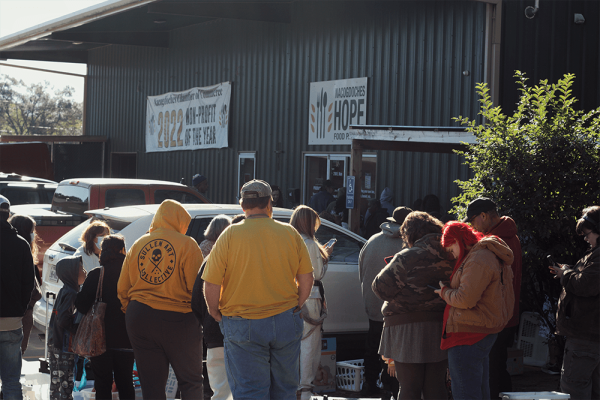What is an “evangelical” is a question now at stake on a global level. Last week at Wheaton College, a historic evangelical site, 50 fairly diverse leaders met to pray and discern together the future of evangelicalism in the U.S. When Fox News, Breitbart, and CBN (Christian Broadcasting Network) launched coordinated coverage of the meeting as “ Trump bashing,” featuring the Trump evangelical advisers to the president, you knew the meeting hit a nerve.
I was there. The stated purpose of the gathering at Wheaton, with people across the political spectrum, were, according to the co-chairs of the event:
… to have an honest dialogue about the current state of American evangelicalism and to discuss the movement’s future…includ[ing] a reaffirmation of [our] shared commitment to the Greatest Commandment to love God and [our] neighbors (Matthew 22:36-40), and [our] belief in the dignity of all people as created in the image of God. The group also repented for areas in which evangelicals have not been faithful to biblical teaching, and examined how the public witness of American evangelicals has, and has not, reflected the life and teachings of Jesus.
Many of us, who still call ourselves evangelicals, are dealing with these three things:
- How do we deal with the astonishment of evangelicals around the world about what is happening in America with white evangelical support for Donald Trump?
- How do we deal with the deep and painful racial division and sense of betrayal from evangelicals of color that Trump’s use of racial bigotry was not and is not a deal-breaker for a majority of white evangelicals?
- Why has Trump received such strident and vocal support from certain white evangelical leaders that goes far beyond pragmatic policy agreements, but has descended to unfettered and uncritical adulation for a man whose personal and public life has been consistently, unapologetically morally corrupt? Does such blatant hypocrisy in support of a man whose beliefs and behavior have been consistently antithetical to the gospel of Jesus Christ risk losing a whole generation of young people for Christian faith?
The best word to describe the environment of Wheaton event wasn’t “bashing” — rather, it was deep embarrassment and deep concern about the future of evangelical faith.
My reflection on being at the Wheaton gathering, and the reaction to it by the Trump evangelicals and their far-right media allies, is that the problem was not the “political” nature of the event as they accused; the event did not have a political, but a hopeful, reconciling tone. Rather, the deeply concerning problem was and is precisely the political, not religious, character of the Religious Right’s attack and their total identification with Donald Trump.
History is very important to understand here and very few people do — even many of those who were at the meeting, and certainly those in the media who lack religiously literacy and too often are hostile to religion.
Let me share some of the history that is crucial to understand.
In 1971, the movement that became Sojourners was born at an evangelical seminary, Trinity Evangelical Divinity School in Chicago. We preached the gospel of Jesus Christ, which is transforming both personally and socially — a holistic message aimed to change our lives and the world.
In 1973, I worked with Evangelicals for Social Action in a gathering Ron Sider convened, again in Chicago, which produced a document called the "Chicago Declaration of Evangelical Social Concern." It says in part:
We acknowledge that God requires love. But we have not demonstrated the love of God to those suffering social abuses. We acknowledge that God requires justice. But we have not proclaimed or demonstrated justice to an unjust American society…
Although the Lord calls us to defend the social and economic rights of the poor and oppressed, we have mostly remained silent. We deplore the historic involvement of the church in America with racism and the conspicuous responsibility of the evangelical community for perpetuating the personal attitudes and institutional structures that have divided the body of Christ along color lines. Further, we have failed to condemn the exploitation of racism at home and abroad by our economic system.
… we call our fellow evangelical Christians to demonstrate repentance in a Christian discipleship that confronts the social and political injustice of our nation …
Before God and a billion hungry neighbors, we must rethink our values regarding our present standard of living and promote a more just acquisition and distribution of the world’s resources.
… we must challenge the misplaced trust of the nation in economic and military might – a proud trust that promotes a national pathology of war and violence which victimizes our neighbors at home and abroad. We must resist the temptation to make the nation and its institutions objects of near-religious loyalty.
We acknowledge that we have encouraged men to prideful domination and women to irresponsible passivity … we call both men and women to mutual submission and active discipleship…
We proclaim no new gospel, but the gospel of our Lord Jesus Christ who, though the power of the Holy Spirit, frees people from their sins so that they might praise God through works of righteousness.
We endorse no political ideology or party … [but] make this declaration in the biblical hope that Christ is coming to consummate the Kingdom and we accept his claim on our total discipleship until he comes.
That was 45 years ago. Reading it again at the Wheaton meeting was heartbreaking — realizing how far in the wrong direction “evangelicalism” has now gone, so diminished and distorted. In my tradition, we would call that spiritual “backsliding.” Read the declaration now — all of it — and see how much we have gone backwards.
Also take a look at the list of signers back in 1973. We were “young evangelicals,” including black evangelicals, the first evangelical feminists, some global evangelical leaders, but also some of the leading establishment white evangelical leaders at the time — including some who were invoked at the Wheaton meeting last week, like the founding editor of Christianity Today Carl F. H. Henry. As the final editor of the Chicago Declaration, I can attest that Henry and I we went back and forth on every “jot and title” as those who knew him would expect! This was a multiracial and intergenerational statement unanimously agreed to after two days of retreat together. We all felt it was work that God had done.
At the time, the “Chicago Declaration of Evangelical Social Concern” gained great attention in the evangelical world, schools, and seminaries, and it was a big news story. And until 1980, we were called the “young evangelicals” in a “new evangelical” movement.
So what happened?
Politics happened. A political assault and takeover was successfully executed by the Republican right wing — and the “Religious Right” was born. White evangelicals, in particular, were targeted by a far-right movement steeped in racism and were deliberately politicized. It is now painfully clear that the evangelical world was strategically and politically co-opted — not by more conservative evangelical leaders, but by political operatives from the Republican Party who saw a real opportunity to take over the evangelical world by making particular appeals to “conservative social issues.”
This isn’t hyperbolic rhetoric. Those right-wing political operatives — like Richard Viguerie, Paul Weyrich, Kevin Phillips, and Terry Dolan — would later say as much about what they did and how they did it to recruit white evangelicals. They approached fundamentalist leaders like Jerry Falwell and Pat Robertson and offered to make them household names if they gave them their mailing lists. Richard Viguerie, now a cordial dialogue partner of mine and ally on ending capital punishment, was the direct mail guru of the day. Richard and his fellow Republican activists created new organizations like the Moral Majority, with Falwell and Robertson as the public figures with them — the political operatives — behind the scenes. That politicization of white evangelicals has now culminated in their unbelievable, uncritical support for a man like Donald Trump.
This was never a theological debate; it was a political take-over — and it worked. While Sojourners was referenced as “young evangelicals” in the 1970s, by 1980, we were called an “alternative to the Religious Right” — and those on the right have called us leftist ever since. I have always resisted being called “the religious left.” Sojourners cares so deeply about poverty and racism and war because of the Bible, not because of political ideology. “Progressive evangelicals,” as some of us are now called, have regularly challenged the Democrat’s extreme positions on abortion, have affirmed covenantal sexuality, and consistently push Democrats to go much deeper on both racism and poverty — which is why so many of us feel politically homeless. Now already, the far-right is targeting young evangelicals of color, some of whom were the co-chairs of the Wheaton meeting, as “political,” on the left, as Democrats and Obama supporters. They continue to try to politicize us despite the historical fact that it is they and their far-right allies who have been the ones to politicize the evangelical world.
Evangelical scholar and activist Lydia Bean told the Wheaton meeting last week that the far-right doesn’t even need religious figures anymore to reach their evangelical targets, as Fox News has captured the white evangelical audience and can reach them directly now. Even evangelical megachurch pastors wearily tell me, “I have my people for about two hours a week if I’m lucky, but Fox News has them 24/7. I can’t compete with that.” Is MSNBC partisan, too? Of course, but they and other cable and mainstream outlets don’t represent religious people, and often even neglect or disrespect them. The “liberal media” actually likes to cover the Religious Right and Trump evangelicals because of the way it paints Christianity as extreme, which confirms existing biases — and gets clicks.
With all due respect, I must also say that I believe the established evangelical leaders who signed the Chicago Declaration with us “young evangelicals” so long ago, like Carl Henry, Vernon Grounds, and Frank Gaebelein, would have spoken out against the rise of the Religious Right as not truly “evangelical” — and, I believe, certainly would have stood up against the candidacy and presidency of Donald Trump. But very few of their establishment evangelical successors have done so. They have remained silent.
One of those exceptions has been Russell Moore, President of the Ethics & Religious Liberty Commission of the Southern Baptist Convention, who publicly opposed Trump during his campaign for his amorality, incompetence, immaturity, and racial bigotry. And he has paid a price for his truth-telling. Another courageous exception to evangelical silence spoke at the Wheaton meeting. Mark Labberton, the President of Fuller Theological Seminary, which is the largest and most diverse evangelical seminary in the country, was the only white evangelical leader who spoke the unvarnished biblical truth about racism and white supremacy in American society and the church at the Wheaton gathering. See his statement here, which we published yesterday. Labberton is listening to his students of color from America and around the world, and it has shaped his view of what the evangelical future must look like. Thanks be to God for both of them, for standing alongside and listening to the leadership of their brothers and sisters of color in the body of Christ — which is the most diverse human community on the planet and will lead the future of the church.
What we are now engaged in is “spiritual warfare,” as described in our Scriptures. We don’t finally put our trust in politics, but in God who will win with the long arc of the universe that “bends toward justice” as Dr. King reminded us. I only made one comment at the end of the Wheaton meeting when I said, “I have been listening as I hope you all have been too. The question this meeting is asking about the future of evangelicalism has been answered by the voices of color and women in this room (pointing to several of them). They are pointing us to the evangel, the good news Jesus said he would bring to the poor in his opening statement in Luke 4. That’s our future, let’s listen.”
As one of the white evangelical leaders in the Wheaton meeting had said to me before, “American evangelicalism is destroying the evangel.” It is time for the evangel to turn white evangelicalism in America upside down.
Got something to say about what you're reading? We value your feedback!






